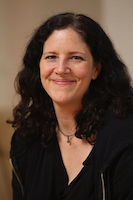First contact
It was against this background that reporter Barton Gellman in February 2013 received an encrypted email from his friend and colleague, Laura Poitras, an award-winning American documentary filmmaker who had reported extensively on the post-9/11 war on terror. The two had met in 2011 when both were fellows at New York Universitys Center on Law and Security. Poitras had moved to Berlin after repeatedly encountering intense scrutiny at the US border. As a journalist whos trying to deal with work that the government is very interested in trying to keep secret, I feel an obligation to do whatever I can to protect the sources and the people that Im working with who are taking great risks to talk to me, Poitras told National Public Radio. At the moment, it feels safer for me to work outside of the United States, which is a sad thing to say. [13]

John D. and Catherine T.
MacArthur Foundation
Laura Poitras
Poitras told Gellman she would be coming to New York City and asked whether they could meet on a confidential matter. Gellman was a two-time Pulitzer Prize winner. He had covered the military and national security for the Washington Post since 1990. In 1999, he moved to New York City, but continued to work on special projects for the Post as well as nonfiction books.
For his projects, Gellman often delved deep into classified material. In 2003, for example, he went to Iraq to write about whether it possessed weapons of mass destruction. Trying to unpack the truth of the WMD question in Iraq in 2003, which took me a whole year and brought me to Iraq twice, that was really difficult reporting. Very murky. Lots of classified material to deal with, he recalls. [14] Another prominent project was a June 2007 series he co-authored about Vice President Dick Cheney, which eventually resulted in a book. [15] Cheney for sure was the hardest project I had taken on [to date], he comments.
Gellman learned a valuable lesson from those experiencesto do their job, national security reporters often had to rely on material declared classified. If you want to know what's going on in foreign policy or wartime or intelligence policy-making or intelligence operations, everything that you want to know that isnt in Congressional testimony or a news conference is basically going to be classified, he notes.
Classification is rampant. Some of its appropriate. Some of its a close call. Some of its clearly unnecessary or classified for reasons that we shouldnt sanction, like to cover up embarrassment.
But Gellman enjoyed any kind of reporting that examined powerhow it was gained and how it was used. National security policy often involved jockeying for power among a variety of constituents. He muses:
I want to enable the normal checking powers that we say are important to us in the marketplace, in civil society, in politics, in law. None of those checks can operate without some transparency, without information. Information is power. And national security questions pose some special dilemmas and offer special challenges when youre trying to hold institutions accountable. For sure, big parts of what they do have to be secret. But when they make decisions in their kind of closed world that theyre going to do something dramatically new, radically different from what has been done before, what has been sort of taken for granted as policy by the public for years then thats something I think needs to be brought out.
Gellman on national security reporting.
In 2010, Gellman resigned from the Post toconcentrate on long-form reporting and writing projects. He also secured a non-exclusive, renewable freelance contract with Time magazine. He taught courses at Princeton, and had an association with two policy centers at New York University. Eventually, he applied for and in March 2013 would be a senior fellow at the Century Foundation, a non-partisan think tank.
Tradecraft . In dealing with classified materials and confidential sources, Gellman had learned how to protect his notes. Since at least 9/11 and probably before that, Ive been very concerned about leaving digital trails to my sources, Gellman says. Over the years, Ive taught myself how to use the privacy and security tools that are out there and how to come up with a much more secure workflow to make it harder to get at my notes or to find out who Im talking to. He used anonymity software, which disguised his digital footprint (his network identity and web address), and encryption software, which scrambled the content of his communications online while it was wending its way to his recipient.
During their fellowship, Gellman had taught Poitras how to encrypt her material, both online and on her computer. So receiving an encrypted email from Poitras was not unusual. I know her to be a very cautious and level-headed person, Gellman says. She said, Please, dont bring your phone. So I knew when she said confidential, she meant really confidential. Cell phones, even when turned off, could be turned into a recording device without the owner knowing it.
[13] Melissa Block interview with Laura Poitras, Sept. 11 Documentarian wins MacArthur Genius Grant, National Public Radio, October 2, 2012. Retrieved June 21, 2014. See: http://www.npr.org/2012/10/02/162176992/sept-11-documentarian-wins-macarthur-genius-grant/
[14] Cabes interview with Barton Gellman in New York, NY, on April 21, 2014. All further quotes from Gellman, unless otherwise attributed, are from this interview.
[15] Barton Gellman, Angler: The Cheney Vice Presidency (New York: Penguin), 2008. The Washington Post series won the 2007 Pulitzer Prize for national reporting.